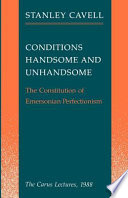 detect and watch that gleam of light which flashes across his mind from within, more than the lustre of the firmament of bards and sages. Yet he dismisses without notice his thought, because it is his. In every work of genius we recognize our own rejected... detect and watch that gleam of light which flashes across his mind from within, more than the lustre of the firmament of bards and sages. Yet he dismisses without notice his thought, because it is his. In every work of genius we recognize our own rejected...  The Complete Works of Ralph Waldo Emerson - Page 47by Ralph Waldo Emerson - 1876Full view The Complete Works of Ralph Waldo Emerson - Page 47by Ralph Waldo Emerson - 1876Full view - About this book
 | Stanley Cavell - 1990 - 207 pages
...human, beginning from a famous early sentence of "Self-Reliance" I have already had occasion to cite : "In every work of genius we recognize our own rejected thoughts. They come back to us with a certain alienated majesty." The idea of a majesty alienated from us is a transcription of the idea of the sublime... | |
 | Daniel T. O'Hara - 1992 - 348 pages
...This meditation anticipates Emerson's famous remark from the opening of "Self-Reliance" (1841) that "in every work of genius we recognize our own rejected thoughts: they come back to us with a certain alienated majesty" (259). But who is really speaking in this journal entry? And to whom? We say in... | |
 | Christoph K. Lohmann - 1993 - 232 pages
...(because antithetical) composite with Emerson, Bloom's avowed Father-figure. When Emerson writes that "In every work of genius we recognize our own rejected thoughts; they come back to us with a certain alienated majesty," the experience of one's dispossession by books is converted into personal power,... | |
 | Christoph K. Lohmann - 1993 - 232 pages
...(because antithetical) composite with F.merson, Bloom's avowed Father-figure. When Emerson writes that "In every work of genius we recognize our own rejected thoughts; they come back to us with a certain alienated majesty," the experience of one's dispossession by books is converted into personal power,... | |
 | Kevin P. Van Anglen - 1993 - 280 pages
...is that they set at naught books and traditions, and spoke not what men but what they thought. . . In every work of genius we recognize our own rejected thoughts: they come back to us with a certain alienated majesty. 23 This famous declaration reveals a more fundamental reason why “John Milton”... | |
 | Stanley Cavell - 1994 - 214 pages
...within, more than the lustre of the firmament of bards and sages. Yet he dismisses without notice his own thought, because it is his. In every work of genius...rejected thoughts; they come back to us with a certain alienatcdmajesty." Here I find a specification of finding myself known in this text; in it certain... | |
 | Stephen Mulhall - 1994 - 386 pages
...or in which she was uninterested. Cavell sees the latter point as captured in Emerson's claim that ‘In every work of genius we recognize our own rejected thoughts; they come back to us with a certain alienated majesty'; and he sees the former as embodied in Emerson's related claims that ‘He who has... | |
 | Donald E. Pease - 1994 - 356 pages
...shall be forced to take with shame our own opinion from another.” In fact, according to Emerson, “In every work of genius, we recognize our own rejected thoughts; they come back to us with a certain alienated majesty.”¿ Alienation of property would seem to be the standard occurrence when different... | |
 | Shawn James Rosenheim, Stephen Rachman - 1995 - 388 pages
...within, more than the lustre of the firmament of bards and sages. Yet he dismisses without notice his own thought, because it is his. In every work of genius...rejected thoughts; they come back to us with a certain alienated majesty" (ibid., 151). Here I find a specification of finding myself known in this text;... | |
 | William M. Shea, Peter A. Huff - 2003 - 378 pages
...terms. A characteristic of this authorship is announced in the opening paragraph of "Self-Reliance": "In every work of genius we recognize our own rejected thoughts; they come back to us with a certain alienated majesty." Even among those readers who know this sentence well, there is resistance in taking... | |
| |